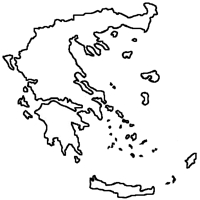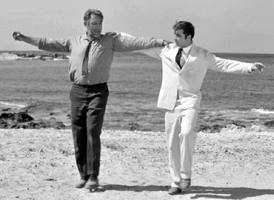
|
The Society of Folk Dance Historians (SFDH)
Folk Dance Among the Greeks
[
Home |
About |
Encyclopedia | CLICK AN IMAGE TO ENLARGE |

|
 The forceful way in which the Greeks attack some of their cultural identity brings us to the core of the role that dance plays in their lives. It is no accident that their dance tradition, traced to their ancient heritage, is a viable force in their lives. From the earliest trends of development in Greek civilization and with it, their significance and dominance in the arts, they gave strong attention to the expression of movement which resulted in very specific forms by which first, in religious ceremonies, and later, in secular activities, dance was one of the foremost ways of utilizing their expressive talents of communicating and relating to each other. Needless to say, dance was maintained as a stronghold in the hearts and feelings of the Greek people as a kind of ensuring factor of their existing identity in the process of declining leadership as a world power and the ensuing invaders that plowed through their landscape, subjecting dominations.
The forceful way in which the Greeks attack some of their cultural identity brings us to the core of the role that dance plays in their lives. It is no accident that their dance tradition, traced to their ancient heritage, is a viable force in their lives. From the earliest trends of development in Greek civilization and with it, their significance and dominance in the arts, they gave strong attention to the expression of movement which resulted in very specific forms by which first, in religious ceremonies, and later, in secular activities, dance was one of the foremost ways of utilizing their expressive talents of communicating and relating to each other. Needless to say, dance was maintained as a stronghold in the hearts and feelings of the Greek people as a kind of ensuring factor of their existing identity in the process of declining leadership as a world power and the ensuing invaders that plowed through their landscape, subjecting dominations.
Though their language was retained, the non-verbal means of communication was even more strongly emphasized as a way of retaining one's identity in the midst of the invader who, along with the subjugation, exercised a foreign cultural influence. It is this great big question that has confused laymen and scholars for years as to who truly exercised more influence in a race that has been subject to many foreign dominations – the invader or the conquered? The answer is simpler than would seem, for we can draw significant parallels with other forms of expression.
My attempt here is not to ponder through a massive collection of scholarly material to substantiate the validity of certain forms of expression remaining true and pure if need be. If the language remained the same with only a minute difference, if the religion remained the seme, also with hardly a seepage of influence, and there is enough reason to believe the customs, traditions, stories, or folklore remained the same, then the dance can also be traced back to the times of the great periods in which the civilization in its own renaissance developed. Furthermore, and that perhaps is one of the strongest clues we have in Greece and some of the Balkan countries, that because of their domination during the great Renaissance Period of Europe, where the cultural influences were disseminating at a rapid pace and other great changes were taking place, later to give rise to the Great Industrial Revolution, these Middle Eastern and Balkan Peninsula nations remained divided from what became known as Western Europe. It is perhaps one reason why so many of these countries are enjoying a belated renaissance, and second, why the folk arts are still vibrant, since these lands are recent migrants to the Western Hemisphere, culturally speaking.
 Dance, therefore, in every society, plays an important role in depicting the temperament, the needs of her people, and the attitudes by which they live. Without creating a thorough historical investigation, we could easily point our finger to a couple of rather distinctive moments that can be seen immediately and clearly what aspect dance has played in our society. After the rage of the ballroom era and the aspect of dancing 'cheek-to-cheek', the youth, always the forerunner of trends, broke loose into the Twist, then "Rock-and-Roll," and then sheer abandonment in movement, but in a "solo-type" of dancing. Now our so-called solo dancers are slowly beginning to reach for each other on the dance floor . . . touching so to speak . . . again, relating to our times, from "doing our thing" to getting to know each other.
Dance, therefore, in every society, plays an important role in depicting the temperament, the needs of her people, and the attitudes by which they live. Without creating a thorough historical investigation, we could easily point our finger to a couple of rather distinctive moments that can be seen immediately and clearly what aspect dance has played in our society. After the rage of the ballroom era and the aspect of dancing 'cheek-to-cheek', the youth, always the forerunner of trends, broke loose into the Twist, then "Rock-and-Roll," and then sheer abandonment in movement, but in a "solo-type" of dancing. Now our so-called solo dancers are slowly beginning to reach for each other on the dance floor . . . touching so to speak . . . again, relating to our times, from "doing our thing" to getting to know each other.
In Greece, almost inadvertently, they have abandoned the local traditions, even in the villages, because they feel trying to hold onto these ideas is "old fashioned" and after all, everyone in life is always trying to catch up with the latest trends and fashions, and since dance has entered the scene as a trendmaker, then it must suffer the consequences of "modernism." The development of tourism in Greece however, and the films "Never on Sunday" and "Zorba, the Greek," had their impact, particularly outside of Greece, as thes films haven't been shown in Greece until quite recently, and even then, were not received with any acclaim, for modern Greeks do not fare well to accept criticism the way Europeans dish it out. The ability to criticize yourself, even when you are at your peak, speaks to the height of civilized man, and since these films did have some aspects of criticism, or rather, brought Greek life to a certain realism, the Greeks were not humble enough to accept that internationally. But the outside world viewed these cinematic excursions as two rather vibrant and strong affirmations of life and considered them as tremendous forces. They were not only cinematic experiences but they began to influence aspects of culture, thus bouzouki music began to crawl out of its dens of iniquity and share the spotlight with other major forms of music as entertainment, and the celebrated Athenian who was a kind of European snob and always inclined to be rather British or Francaise in his kind of malaise as he circulated around the music halls, theatres and nightclubs, began to become an aficionado of the bouzouki taverns. After slowly dealing with the so-called "koutsavakia" or "manghes," an elite group of the underworld, Greek dance began to gain popularity with the upper and middle classes, and thus it was made fashionable! Into it crept the "Syrtaki" dances and the "Hasapiko," more as an affectation than as a viable form of expression necessary to the life of the Greeks. The Greeks in Greece however, still continued to keep their eyes on the western countries and tried to follow those trends that seemed to have become popular in Europe and the United States.
The outside world however, began to become aware of Greek music, of Greek dancing, and slowly, small groups began to rise to create a sense of popularity about Greek dancing, because within the group movements, the line dancing and the music that created a sense of abandon and a feeling of glow related to this traditional form. This form, which had been restricted to the Geeks in the past had now begun to be accepted as a means of people relating to each other in a meaningful and communicative way. It gave them a feeling of belonging and a part in a cultural heritage that had roots in history, not limited to the trends that were merely fashionable.
Greek emigrants in various parts of the world always attempted, historically, to hold onto their Hellenism as well as to those areas of religion, language, and culture. In the United States, the history ran into conflict at times in areas where seemingly ghetto life was created purely by emotional needs and the relationships which sprouted from those raising in the United States lost their connections to the cultural ideas that their parents had. Many though, tried to create organizations, institutions, churches, festivals and socials, in order to do whatever was possible to keep a homogeneity together, but the currents of the fast-moving world are strong, and regardless of how much we strive to keep obstacles before them, the gush and torrents of the flowing progress sweeps it away.
And so we are now onto an aspect of Greek dance as a cultural expression where it is almost liberated from the sentimentality of a parent wishing to see his child dressed in a home-made version of some wrinkled velvet embroidered jacket, to be worn on a national holiday when the Greek-Americans would reach out with determination to retain some identity to show that their progeny was not only a brave one but one that had contributed to the world generously. Through this hope that the neighbor in the city or the suburbanite would try to gain some creditability since he did not have coat of arms or some founding father of the American Revolution, but nevertheless, was from a "rich" background, he was one who had gained a great importance in the eyes of not only learned men, but every aspect of society.
The traditional dance by the local church steps or below in the recreation room afterwards, for those who sought to strive to maintain some "Greekness" gave voice to magazine articles, some short stories, a few novels, shows, and the like. And the Greek in the United States took his place in the long line of nationalities to live peacefully here, from those who came from distant lands of Asia and Africa, as well as the hostile neighbor in the old country, because the solidarity in the United States shifted gears after World War4 II from the melting pot of the world idea to the concept of accepting one's identity and maintaining a firm and strong America.
DOCUMENTS
- Athan Karras, an article.
- Balkans, a region.
- Europe, a region.
- Greece, a country.
Printed in Folk Dance Scene, October 1975.
This page © 2018 by Ron Houston.
Please do not copy any part of this page without including this copyright notice.
Please do not copy small portions out of context.
Please do not copy large portions without permission from Ron Houston.